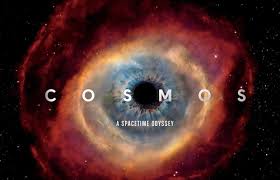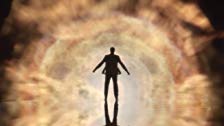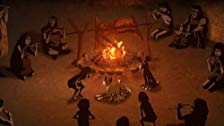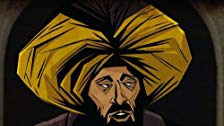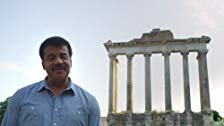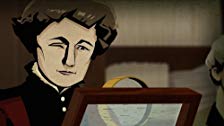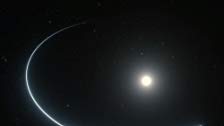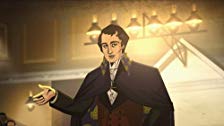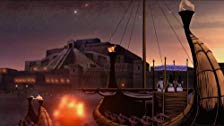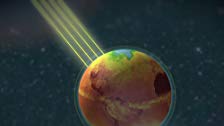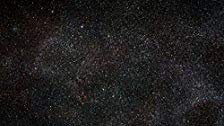Cosmos 2014
As I mentioned on the main astronomy page,I used to like Neil deGrasse Tyson more than I do now. I'm not sure why, but at some point he jumped the shark at some point. The production value is good though, and it's a decent update to the orginal...
Comos (2014) - Neil deGrasse Tyson
This is the general description of the course/series. It's pretty bald.
An exploration of our discovery of the laws of nature and coordinates in space and time.
Season 1
Currently (April 2019) the only season, but I understand they're planning to make more.
Episode 1 Standing Up in the Milky Way 
Neil starts the series by reminding us of Carl’s legacy, and giving us a quick overview of the series topics. He also introduces the new starship of the imagination, and the scientific method, and our “cosmic addresses” by touring the galaxy. Next he introduces us to Copernicus and the heliocentric solar system. Next he reintroduces the Cosmic Calendar, and walks us through the overview of it’s important dates. He closes with the cute story about how he met Carl on a visit to Cornell.
A thrilling, new adventure across space and time begins.
Episode 2 Some of the Things That Molecules Do 
This begins this series description of artificial selection, with the domestication of animals, to do our work and be our companions. He then moves on to natural selection by talking about brown bears versus polar bears (with the usual bunk about Global Warming and their possible extinction - setting aside the fact that the population is booming, and ignoring the evidence that we’re not warming anywhere near as fast as the models predict, and that it’s likely related to solar maxima and minima).
Even worse, a little over halfway through he goes on a bit of diatribe about how the theory evolution is fact, just like the theory of gravity. This is the trap I dislike so much. Science does not offer us facts. We have theories that match the data, and we keep them until we find a better theory or better data. So, yes, I believe gravity and evolution are our current best theories, but I leave open the possibility that a better theory exists.
Artificial selection is one example, eyes another, of the well-documented and inescapable process of evolution--change in a population of species over time--by natural selection. These are some of the things that molecules do.
Episode 3 When Knowledge Conquered Fear 
This
Neil deGrasse Tyson sets off on the Ship of the Imagination to chase a single comet through its million-year plunge toward Sol. Later, Tyson visits the birth-place of Sir Isaac Newton and retraces the unlikely friendship between Newton and brilliant polymath Edmond Halley. It was Halley's patience and generosity which allowed Newton to conquer his fear of isolation and find the courage to publish his masterwork, "Principia Mathematica" which launched a scientific revolution.
Episode 4 A Sky Full of Ghosts 
This
Explores how light, time and gravity affects our perception of the universe
Episode 5 Hiding in the Light 
A
The Ship of the Imagination travels back in time to reveal 11th century Europe and North Africa during the golden age of Islam, when brilliant physicist Ibn al-Haytham discovered the scientific method and first understood how we see, and how light travels. Later, William Herschel discovers the infrared and the signature hidden in the light of every star, eventually unlocking one of the keys to the cosmos.
Episode 6 Deeper, Deeper, Deeper Still 
A
The Ship of the Imagination ventures on an epic voyage to the bottom of a dewdrop to explore the universe on the smallest scale and observe exotic life forms invisible to the naked eye. Then, host Neil deGrasse Tyson explains the neural network in our brains which determine our sense of smell and memory, and later, he travels deep beneath the surface of the Earth to discover the most mysterious particle we know.
Episode 7 The Clean Room 
A
To determine the true age of the Earth, geochemist Clair Patterson developed the uranium-lead dating method to make an unprecedented discovery - calculating Earth's age of 4.5 billion years. But Patterson's groundbreaking discoveries were just beginning. Patterson made it his mission to draw public attention to the detrimental effects of lead in the environment and dedicated his career to fighting against the petroleum and chemical industry, eventually achieving public health's biggest victory of the 20th century.
Episode 8 Sisters of the Sun 
An
Explores the violent cosmic phenomenon of supernovas, which on average occur once per galaxy per century or one billion times per year in the observable universe.
Episode 9 The Lost Worlds of Planet Earth 
Another
The Ship of the Imagination embarks on a journey through space and time to grasp how the autobiography of the Earth is written in its atoms, its oceans, its continents and all living things. Later, American geologist Marie Tharp creates the first true map of Earth's ocean floor, and discovers microscopic life that exists deep beneath the ocean.
Episode 10 The Electric Boy 
Neil launches the episode by explaining that instantaneous long-range communication at light speed would seem like sorcery if Michael Faraday hadn’t studied magnetism. He then discusses how a random night at the Royal Institute, and the notes that he made and sent to Humphry Davy, earned him an apprenticeship.
Travel to 19th century England and meet Michael Faraday, a child of poverty who grew up to invent the motor and the generator. His ideas about electricity and discovery of magnetic fields changed the world and paved the way for future scientists to make giant strides in the world of high technology and instantaneous communication.
Episode 11 The Immortals 
Pretty
The Ship of the Imagination travels across the cosmos to discover the possibility of beings that live forever and explain why other civilizations perish. Then, visit the Cosmic Calendar of the Future and contemplate what lies ahead with a hopeful vision.
Episode 12 The World Set Free 
A
Degrasse discusses our nearest neighboring planet Venus and its climate, the climate change on Earth and if it is caused by humans.
Episode 13 Unafraid of the Dark 
The
Description of the two Voyager probes sent for interstellar travel. Tyson ends the series by emphasizing Sagan's message on the human condition in the vastness of the cosmos & to encourage viewers to continue to explore and discover the undiscovered.
